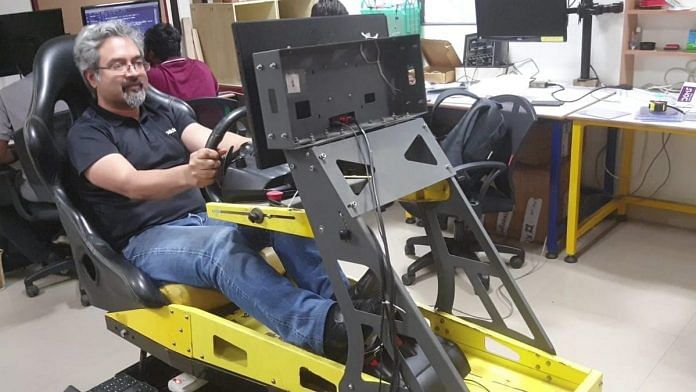Bengaluru, Delhi: If lack of expertise and equipment are preventing you from building your own furniture, or designing a robot, or using 3D printing to create a product prototype, then a ‘makerspace’ could be just the bridge you need between dreaming and doing hands-on work with hardware. And Bengaluru, more than other city in India, has a variety of them, each with its own areas of specialisation.
There’s Koramangala’s 25,000-sq-ft IKP EDEN (Engineering, Design, and Entrepreneurship Network), where high-tech gizmos — including some machines worth Rs 50-60 lakh each and Rs 2 crore worth of biolab equipment — help innovators create all kinds of hardware prototypes, ranging from medical devices to, going by the looks of it, robots shaped like packing boxes.
An hour across town, off the hectic Dodda Banaswadi main road, is THE Workshop, where design, woodworking, and metalwork are the main focus. When ThePrint visited, three girls aged between four and nine were building birdhouses, occasionally putting down their power tools to pet Lico, the resident Shih Tzu.
In yet another corner of Bengaluru, not far from Peenya, one of the largest industrial and manufacturing estates in Asia, is Workbench Projects, where would-be and current entrepreneurs build and test their products. Here, people from a company called Punar were busy working on creating robotic hands, intended to help rehabilitate stroke patients.
While hobbyists, students, and do-it-yourselfers can hone their skills at makerspaces, these establishments also serve as hands-on labs and incubators for startups.
Some projects that started out at makerspaces have gone on to become commercial ventures already. The product design company Brahm, for instance, got a headstart at THE Workshop. Out of Workbench Projects came Rise Legs, which makes cost-effective prosthetic legs for amputees, and from IKP EDEN came drone data analytics company Skylark Drones, and med-tech firm Inito, which specialises in fertility monitors.
Bengaluru has more makerspaces than other Indian city, according to Craig D’Mello, co-founder of THE Workshop, but they have caught on elsewhere too. Delhi, Mumbai, Chennai, Hyderabad, Ahmedabad, and Jaipur all have makerspaces. In April, IIT Gandhinagar opened a Maker Bhavan. But, where Bengaluru is a class apart is that its makerspaces operate in a rich startup culture where there’s a serious market for ideas as well as the infrastructure to make them come to life.
“Bengaluru is the Silicon Valley of India and it is a more mature ecosystem than other parts of the country,” Vikraman Venu, CEO of IKP EDEN, told ThePrint, adding that the density of investors, startups, and skilled talent pool were unmatched elsewhere in the country.
So, what exactly makes makerspaces such a useful addition to the startup “ecosystem” in India, and what exactly do they do? ThePrint spent time at three makerspaces in Bengaluru to find out.
Also Read: India gets its 100th unicorn startup as neobank Open crosses billion-dollar valuation
Controlled costs, collaboration, aligned with ‘Atmanirbhar Bharat’
A makerspace is a place for “creative production in art, science, and engineering”, according to a World Bank report on innovation hubs. Further, it provides an environment where “people of all ages and career paths integrate digital and physical technologies to learn technical skills and create new products”.
“Creative community spaces” such as these, outlines the report, “enable innovation” by serving as places for entrepreneurs and startups to convene, collaborate, and exchange ideas. In so doing, they “anchor entrepreneurial communities and influence the urban economic and physical landscape.”
Importantly, makerspaces also make innovation more cost-effective.
The machines required to cut and bend metal, or print out a plastic body for a robot, or place components on a printed circuit board (PCB) can cost lakhs of rupees, if not more. For many bright young people who don’t have solid experience or funding, this can ring the death-knell of a career in innovation.
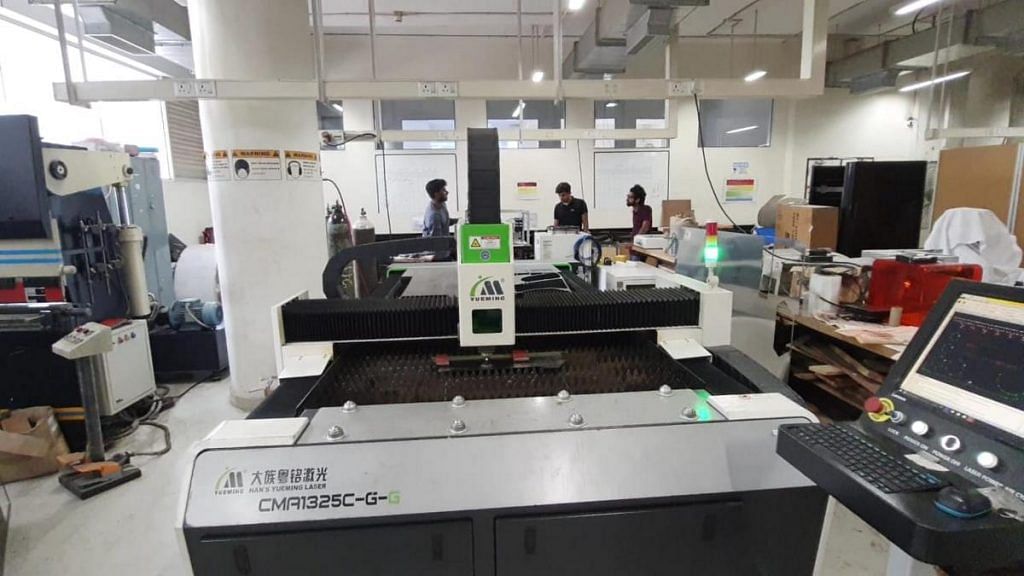
However, makerspaces give entrepreneurs the facilities to test an idea at a fraction of the cost of cutting-edge equipment. These establishments also employ skilled professionals who know how to operate complex machinery, making it easier to build a prototype.
And it’s in line with the idea of ‘Atmanirbhar Bharat’ (self-reliant India), too — for startups that build hardware, makerspaces afford them the opportunity to create their own prototypes at a reasonable price rather than relying on vendors in China or Vietnam.
While some components may still need to be sourced from other countries, building a prototype locally sets the stage for the entire product to be manufactured at scale here in India.
And when it’s Bengaluru, which has the country’s best funding for startups and the highest number of unicorns, the chances of success only go up.
Jai Mandal, the CEO of Apricot Robotics — founded in April this year — is building a floor-cleaning robot from Workbench Projects. For him, doing this work from Bengaluru comes with many advantages.
“This is an environment with great access to venture capital investors and other startups to discuss ideas. Manufacturing is just one aspect of building hardware… other factors like potential clients are important, and Bengaluru has a good potential client base,” Mandal said.
Ajesh J.K. started his career in health tech in Kerala, but shifted to Bengaluru, where he is now building an affordable powered wheelchair system at Workbench Projects. He values the tech infrastructure, but also being around “like-minded entrepreneurs” he can problem-solve with.
ThePrint visited THE Workshop, Workbench Projects, and IKP EDEN to get a sense of how these makerspaces work, what the costs are, and who they cater to.
Also read: The ‘make in India’ dream of an IIT-Delhi startup whose drones lit up sky at Beating the Retreat
THE Workshop — ‘not just for engineers’
Started in 2015 by Anabelle and Craig D’Mello, a wife-and-husband team, THE Workshop caters to children, hobbyists, entrepreneurs, as well as design and architecture students, who come here to build and test prototypes of their ideas. The clientele here ranges in age from preschoolers to people in their late 70s.
When ThePrint visited, three children were learning the art of woodworking. “I like coming here because it’s fun,” a 4-year-old girl at the worktable said.
According to Craig D’Mello, inculcating a love of innovation in children is one of the most rewarding aspects of his work.
“You’re never too young to startup. Tinkering around with ideas, like, ‘Do I use a sensor in this car for voice command?’, a bit of coding, digital fabrication, woodworking, truly builds a culture of innovation and self-reliance for young children,” he said.
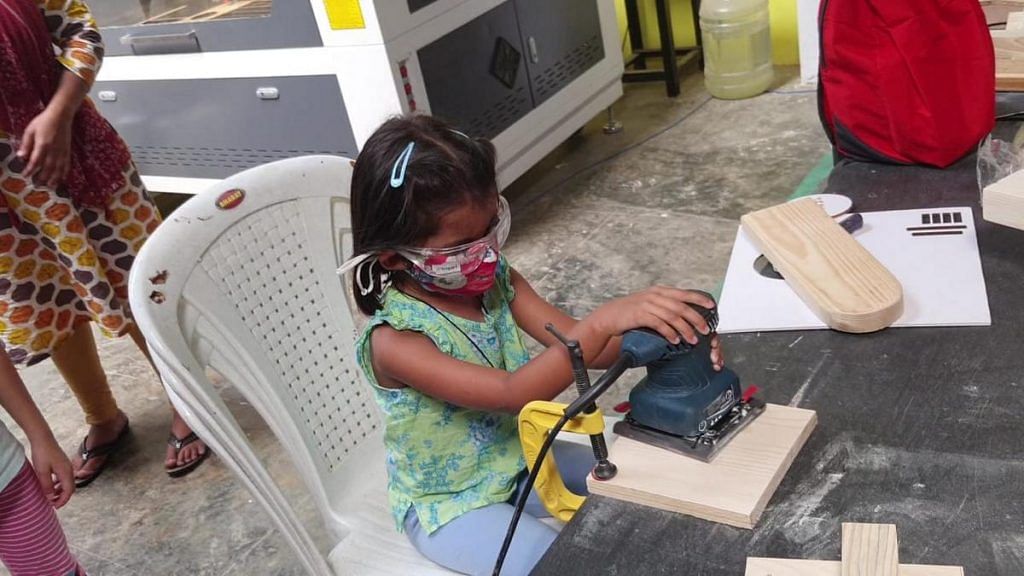
The D’Mellos considered other cities for their business but decided Bengaluru was the best option because of its “good weather” and “conducive culture of innovation”.
“There is a thriving ecosystem of education, industry, technology here and a very forward-thinking cosmopolitan audience,” Craig D’Mello said.
The space takes up one floor, covering about 3,900 square feet, and sees 50-100 visitors each month. Work sessions are kept small, with a cap of about 30 people.
The equipment here includes old-style rasps, hammers, chisels, mallets, and saws, as well as power tools like jigsaws, mitre saws to cut wood, angle grinders for metal work, a router machine for wood work, and scroll saws to cut sharp angles and intricate details in wood. There is a laser cutter costing about Rs 5.5-6 lakh that can etch designs, and cut materials like wood, acrylic, and MDF to make toys, lamp shades, and even components for a robot.
The notion of entrepreneurship should not be limited to engineers but should include artists, architects, and designers, according to Craig D’Mello. He demonstrated how a simple logo — “ThePrint” — can be etched in five minutes on a round piece of wood using the laser cutter. “The cost to make this at a space like this is about Rs 20 a minute. This can retail for much more than that,” he explained.
Payment plans at THE Workshop range from Rs 295 for one hour to Rs 35,400 for three months, not counting security deposits. There are also discounts for students.
Workbench Projects — rapid prototyping, startup incubation
A bumpy road, usually braved only by drivers of heavy vehicles, leads to the industrial area where Workbench Projects is located.
Established in 2013, this makerspace and startup incubator offers some serious machinery, including 3D printers, laser cutters, and computer numerical control (CNC) machines like those used to cut metal with a high-pressure water jet. You don’t want your fingers near it— it cuts through hard material first, so you risk splintering your phalanges before it rips through your flesh.
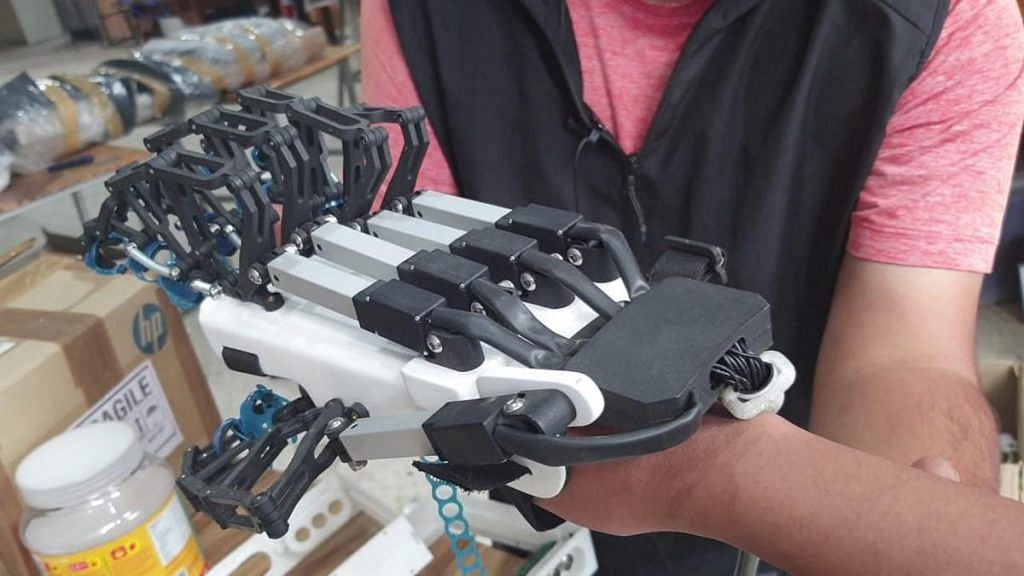
When ThePrint visited, a young design engineer, Abin Gireesh, was working on a robotic device to help stroke patients for the company Punar.
For him, Workbench provided value beyond the machinery at hand. “I graduated college two weeks ago. For a person like me it’s easy to connect with seniors with 10-20 years of experience here, as well as young people, to understand how to solve design challenges,” he said.
According to him, the project he is working on — building a robotic hand — would have been “extremely hard” to do in India a decade ago. Now, it could be designed in Bengaluru and then manufactured in the city itself, or at a unit in Vijayawada or Gujarat.
“You don’t need to go abroad to build this stuff. It was made at this table at Workbench,” Gireesh said.
However, entrepreneur Ajesh J.K. said that though the wheelchair his company is making can be manufactured completely in India, China still has a price advantage for some components.
For instance, Ajesh needs two brushless DC motors for each of the wheels at the back of the chair. While a Chinese vendor is offering a price of Rs 2,000 for each, the rate in India would be closer to Rs 4,500. Ajesh is hoping the cost will come down in the coming months as the technology becomes more mainstream so he can make the wheelchair entirely in India.
There are currently five startups working out of Workbench. The payment plans range from about Rs 2,000 to Rs 12,000 per person each month.
Also read: Grocery startup Zepto, founded by 2 Indian teenagers, crosses over Rs 6,800 cr valuation
IKP EDEN — a hub for hardware startups
A non-profit set up in 2015 by the Hyderabad-based startup incubator and science park IKP Knowledge Park, IKP EDEN focuses on engineering and med-tech startups. It also gives a Rs 10-lakh grant to select startups to start building a protoype out of funds backed by the central government’s Department of Science and Technology.
“Hardware startups have a problem. You can’t just build a product out of home. You need access to machines, tools, labs,” IKP EDEN CEO Vikraman Venu said.
EDEN, which takes up four floors of a building, provides a solution under one roof since it has a “biotech chemistry lab, a mechanical engineering lab, an electronics assembly system, 3D printing, injection moulding [to build a prototype],” said Venu.
The pricing plans vary. Engineering teams are charged about Rs 8,500 per person each month. For carpentry, the monthly cost per person is Rs 4,500.
The box-shaped robot roaming around EDEN was built from scratch at the makerspace by Anscer Robotics. It also serves a function: to move materials at warehouses.
Anscer CEO Ribin Mathew, a first-time founder, said his startup has been incubated at EDEN for the past two years. It took 1.5 years to build the robot, and the last six months have been about sales. “We got a monetary grant to get the product out fast. We started with four people and have grown to 34 now. It’s only possible to do all this only because an EDEN exists”.
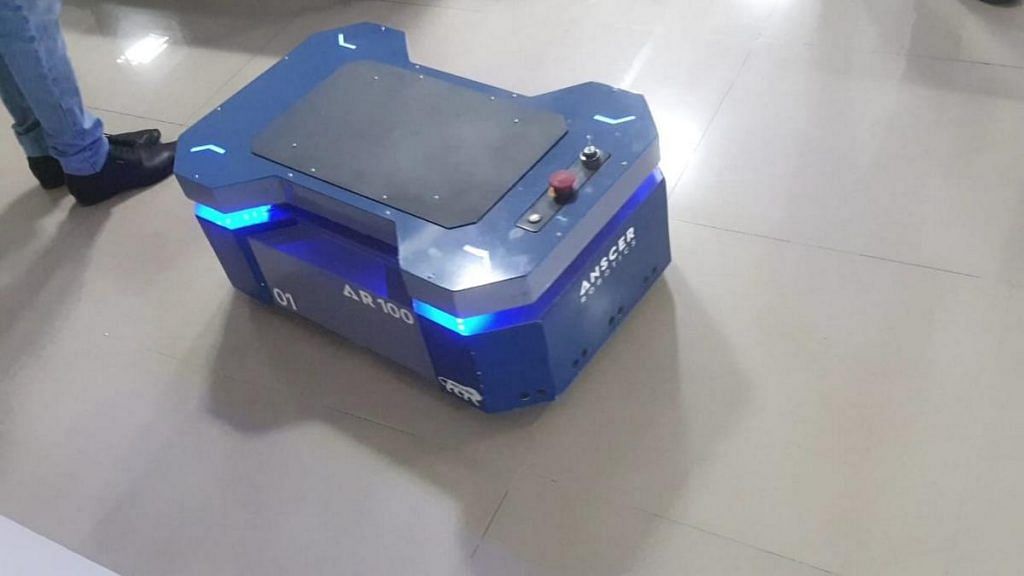
Alok Mohanty, founder of Lazy Idli, a company that works in the field of automation and Internet of Things, also demonstrated a product he had made at the facility — a car simulator hooked to a computer and a monitor showing moving graphics of a road.
“Manufactured, assembled, designed, engineered – it’s M.A.D.E. in India,” Mohanty said.
Mukesh R. Jogi, CEO of Flextron, which makes electric vehicle charging stations, agreed that a lot more can be accomplished now in India. He was using a computer-controlled pick-and-place machine for placing components on a printed circuit board (PCB) that would be going inside the charging station.
The PCB design, the placement of components, the soldering, and the software for this project are all made at EDEN and another incubator, Jogi said.
“If you look on Google, most vendors for PCB placement are from China and Japan. But this work is possible in India,” he added.
(Edited by Asavari Singh)
Also Read: Why Bengaluru isn’t losing any sleep over Delhi becoming India’s ‘startup capital’


